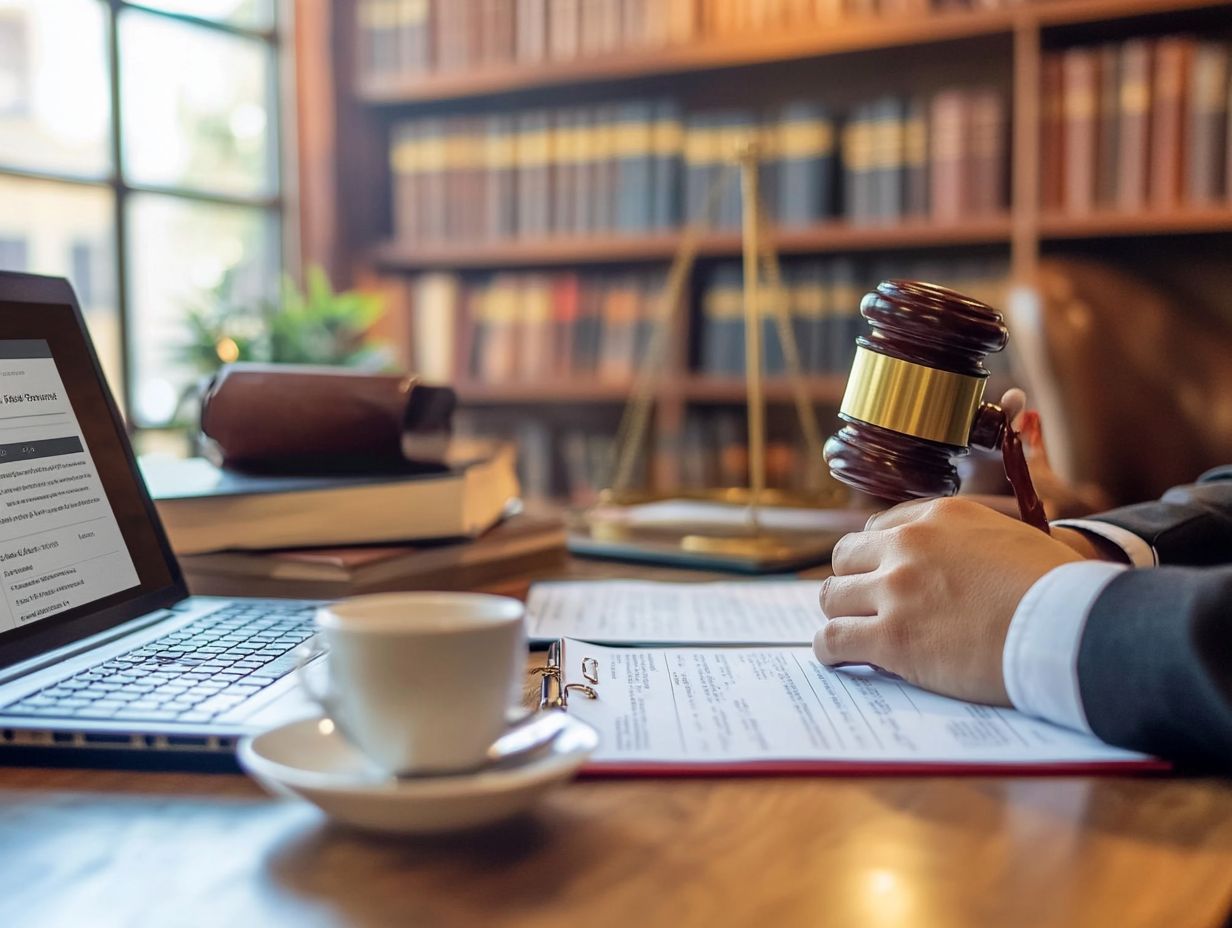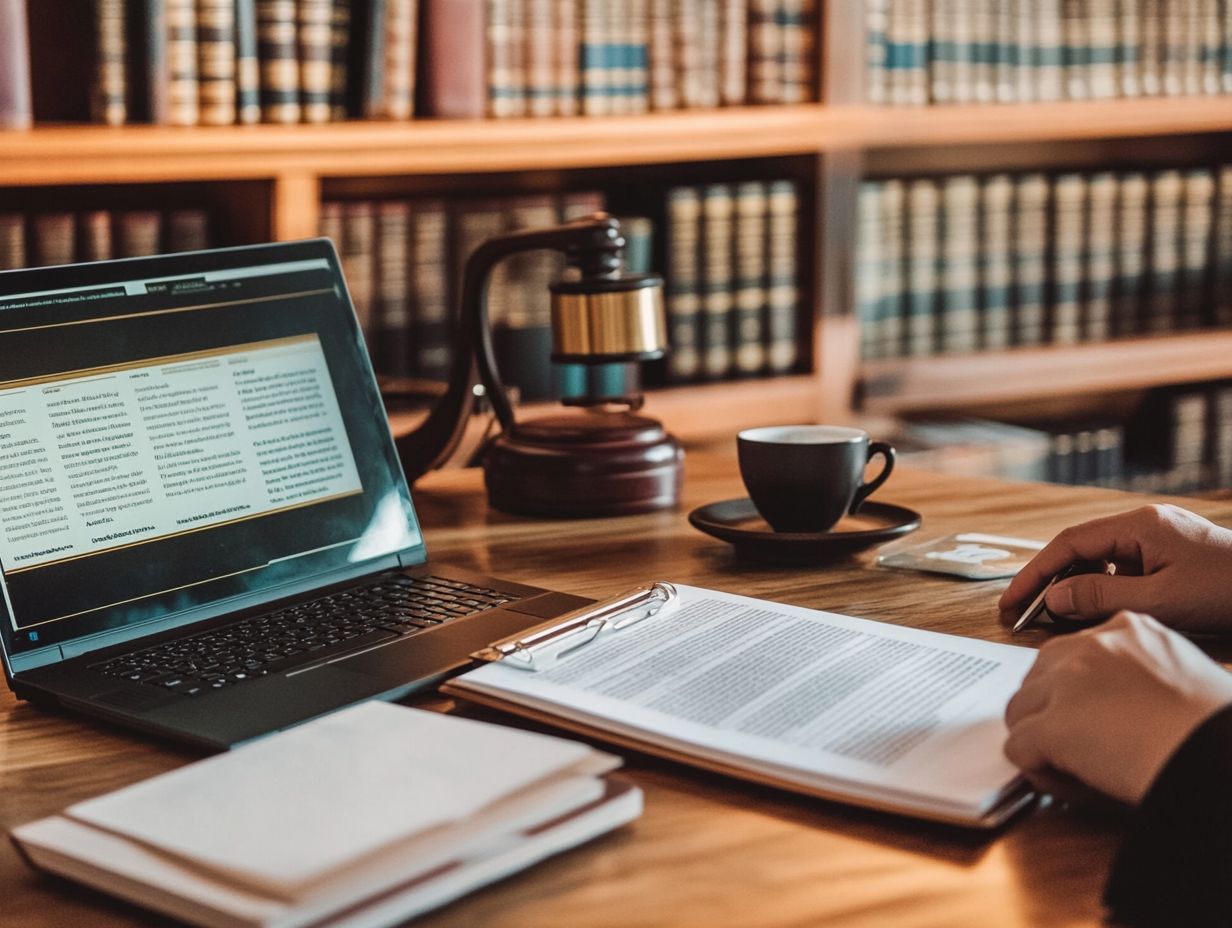5 Tips for Choosing an IP Litigation Attorney
Navigating the complex world of IP litigation can be overwhelming, particularly when it comes to selecting the right attorney for your needs.
Whether you’re facing patent disputes, copyright challenges, or trademark infringements, having the right legal partner can truly transform your experience.
This article delves into five essential tips for choosing an IP litigation attorney tailored to your requirements. From understanding your needs to assessing an attorney’s experience and communication style, this guide will equip you with the insights necessary to make an informed decision.
This article clarifies what IP litigation entails and highlights why having a knowledgeable attorney is essential.
Are you ready to make your search easier? Let s dive in.
Contents
- Key Takeaways:
- 1. Understand Your Needs
- 2. Consider the Attorney’s Experience and Qualifications
- 3. Look at Their Track Record
- 4. Consider Their Communication Style.
- 5. Compare Fees and Payment Options.
- What Is IP Litigation and Why Do You Need an Attorney?
- Frequently Asked Questions
- What is an IP litigation attorney and when do I need one?
- What factors should I consider when choosing an IP litigation attorney?
- What should I look for in an IP litigation attorney’s experience?
- How can I assess an IP litigation attorney’s reputation?
- What should I expect during the initial consultation with an IP litigation attorney?
- How can I ensure a good working relationship with my chosen IP litigation attorney?
Key Takeaways:

Understand your needs and the type of IP litigation case you have to find the right expert for IP litigation that suits your situation.
Consider the attorney’s experience, qualifications, and track record in handling similar cases to ensure they have the necessary skills and expertise.
Look for an attorney with good communication skills who can effectively communicate with you and keep you updated throughout the litigation process.
1. Understand Your Needs
As a business owner, understanding your IP needs is essential for protecting your rights and ensuring legal compliance in your industry.
Start by identifying the types of IP you have whether patents, trademarks, copyrights, or designs and determining how they align with your business interests and growth strategies.
Conduct risk assessments to create effective IP strategies that safeguard your assets and enhance your competitive edge in the marketplace.
Understanding the distinctions among different types of IP enables you to tailor your protection methods effectively. For example, a tech startup might prioritize patents for its innovative products, while an artistic venture could focus on copyright protections for its original works.
Understanding this knowledge is crucial; it impacts your strategic planning, ensuring that resources are allocated wisely and targets are set realistically.
By thoroughly assessing these needs, you can proactively manage potential infringements and leverage your IP to strengthen your market position, ultimately fostering long-term sustainability and success.
2. Consider the Attorney’s Experience and Qualifications
When selecting an IP lawyer, carefully consider their experience and qualifications, as these elements play a pivotal role in your legal representation and in knowing how to prepare for an IP litigation case to achieve successful outcomes in your intellectual property matters.
A well-rounded background in areas like patent law can be particularly advantageous, signaling a deep understanding of the complex regulations and processes at play.
Experience in handling IP applications is crucial; familiarity with the nuances of filing and maintaining these protections often leads to more effective strategies for you.
A solid track record of successful legal advice is not just a bonus; it s a testament to the lawyer’s capabilities. Additionally, industry knowledge significantly enhances a lawyer’s effectiveness, allowing them to offer tailored guidance that addresses the unique challenges and opportunities you face in your sector.
3. Look at Their Track Record
Examining an IP lawyer’s track record is crucial, as it offers valuable insight into their effectiveness in navigating infringement litigation and other legal actions that could impact your intellectual property rights. Additionally, being aware of the top 10 common IP litigation mistakes to avoid can further enhance your strategy.
This evaluation should delve into their previous cases, focusing on success rates in both litigation and settlements.
For example, if a lawyer has successfully defended a client against a significant infringement claim, it showcases their legal expertise and highlights their ability to devise effective strategies under pressure.
Cultivating positive relationships with clients often translates into repeat business and referrals, which speaks volumes about the trust and confidence others have in the lawyer’s skills.
A strong record, paired with evidence of maintaining excellent client rapport, can greatly influence your decision when selecting the right legal representation.
Contact an IP attorney today to protect your rights!
4. Consider Their Communication Style.

An IP lawyer’s communication style is crucial for building a fruitful client relationship. It ensures you receive clear and tailored legal advice that meets your unique needs.
This is not just about responding promptly to inquiries; it also involves maintaining an open dialogue that clarifies complex legal jargon.
When your lawyer breaks down intricate legal concepts into straightforward language, it enables you to make informed decisions with confidence.
Effective communication creates a collaborative atmosphere, allowing you and your attorney to strategize together. This ultimately enhances the partnership.
The ability of an IP lawyer to actively listen and adapt their communication style to you can significantly impact the success of your legal representation. This ensures that no detail of your case goes unnoticed.
5. Compare Fees and Payment Options.
When hiring an IP lawyer, be sure to compare fees to find the best fit for your budget!
Understanding the various fee structures commonly used by IP attorneys can greatly influence your company’s financial well-being.
Many lawyers charge hourly rates, which can fluctuate based on experience and location. Others may offer flat fees for specific services, providing clarity and predictability in costs.
In some cases, especially those involving litigation, you might encounter contingency fees, where the lawyer only gets paid if you win.
As an entrepreneur, understanding these options is essential for your success, particularly in relation to the funding you’ve raised for your business.
This knowledge enables better financial planning and ensures that valuable legal resources are allocated efficiently.
What Is IP Litigation and Why Do You Need an Attorney?
IP litigation encompasses the legal disputes surrounding legal rights that protect your ideas and creations. The expertise of an IP lawyer is essential for navigating these intricate cases and ensuring compliance throughout the process.
These disputes can stem from various scenarios, such as patent infringement, trademark violations, or copyright issues, each carrying significant ramifications.
Engaging an expert in this field is not merely about defending against lawsuits; it s about proactively safeguarding your unique ideas and creative assets.
An experienced attorney can help you grasp your rights, mitigate risks, and formulate strategies that enhance your standing in a competitive market.
With the stakes this high, having effective legal representation is crucial to ensure that your innovations are protected and that your business is shielded from potential threats.
What Are the Different Types of IP Litigation Cases?
Various types of IP litigation cases arise concerning patents, trademarks, copyrights, and designs. Each category demands its own distinct legal approach and strategy to effectively resolve disputes.
For instance, patent litigation often involves complex questions of innovation and technological advancement. Disputes may center on whether a product infringes on existing patents, requiring a keen understanding of design and function.
Trademark litigation typically revolves around the protection of brand identity and consumer recognition. The challenges here often focus on the likelihood of confusion among consumers.
Copyright cases delve into creative works, such as music and literature, and can complicate matters with issues of fair use and originality. Understanding the specific legal frameworks governing these rights is essential for anyone involved in IP disputes.
This makes the role of skilled legal professionals absolutely critical in safeguarding intellectual property.
Don t leave your innovations unprotected! Consult an IP attorney today to safeguard your ideas.
What Are the Benefits of Hiring an IP Litigation Attorney?

Hiring an IP litigation attorney brings a wealth of benefits. They provide expert legal representation, guiding you on how to choose the right patent attorney, which can lead to successful outcomes and ensures compliance with the intricate IP legal framework.
IP attorneys understand the ins and outs of IP laws. They help you avoid mistakes that could harm your business.
Beyond compliance, they craft robust legal strategies that protect your innovations and enhance your business operations by minimizing risks tied to infringement or litigation.
Having an IP lawyer on your side means smoother transactions. They ensure your firm is prepared to leverage its innovations effectively while staying compliant with regulations.
This specialized guidance allows you to focus on your core operations, maximizing your potential for growth.
What Are the Key Qualities to Look for in an IP Litigation Attorney?
When searching for an IP litigation attorney, keep a few key qualities in mind: legal expertise, industry knowledge, and people skills. To ensure you choose the right professional, consider following this guide on how to evaluate an IP litigation attorney. Each of these elements is crucial for effective representation.
A competent attorney not only understands IP law but also stays updated on emerging trends in the industry. This awareness helps them anticipate challenges and seize opportunities on your behalf.
People skills are equally important. A lawyer who communicates clearly and listens attentively understands your unique needs and concerns. This rapport builds trust, allowing for tailored strategies that resonate with your vision and objectives.
How Can You Find Potential IP Litigation Attorneys?
Finding an IP attorney is easier than you think! Start by asking for recommendations or searching online. Additionally, exploring 5 ways to strengthen your IP case before litigation at legal conferences or participating in IP forums can also unveil valuable resources.
Online legal directories are critical tools for identifying reputable attorneys, featuring client reviews and detailed profiles highlighting their specialization.
Professional organizations like the American Intellectual Property Law Association or the International Trademark Association offer valuable insights and connections.
Engaging in thorough due diligence is essential. Scrutinize their backgrounds, check for relevant experience, and understand their track record in handling similar cases to ensure they align with your needs.
What Questions Should You Ask During the Initial Consultation?
During your initial consultation with an IP lawyer, asking the right questions is essential. This ensures you receive informed legal advice that aligns with your business strategy and IP rights.
Ask the lawyer about their experience with cases like yours. This helps you gauge their expertise.
Discuss their approach to crafting legal strategies tailored to your situation, as this can significantly influence your protection efforts.
Understanding how they plan to support your business interests moving forward is crucial. This establishes a foundation for open communication, nurturing a productive client-lawyer relationship based on trust and transparency.
Act now to ensure your IP is protected!
Frequently Asked Questions

What is an IP litigation attorney and when do I need one?
An IP litigation attorney is a legal expert in intellectual property law. They handle disputes related to patents, trademarks, and copyrights.
You may need an IP litigation attorney if you’re facing a legal dispute over your IP rights or want to learn how to handle IP litigation as a plaintiff to protect your IP assets from infringement.
What factors should I consider when choosing an IP litigation attorney?
When choosing an IP litigation attorney, consider their experience in IP litigation cases.
Look at their track record of success, reputation, and communication style. Discuss fees and their case-handling approach upfront.
What should I look for in an IP litigation attorney’s experience?
The attorney’s experience can greatly impact your case’s outcome.
Choose someone who has handled similar cases successfully. It’s also useful to find an attorney skilled in both litigation and alternative dispute resolution methods, like mediation or arbitration.
How can I assess an IP litigation attorney’s reputation?
You can assess an IP litigation attorney’s reputation through several methods.
Ask for referrals from clients or other lawyers, read online reviews, and check their standing with the state bar association. Request references and talk to past clients about their experiences.
What should I expect during the initial consultation with an IP litigation attorney?
The initial consultation is your chance to discuss your case and get to know the attorney.
Expect questions about your case details, goals, concerns, and budget. This is also a good time to ask about the attorney’s experience and fees.
How can I ensure a good working relationship with my chosen IP litigation attorney?
Open communication and trust are key for a good working relationship.
Keep lines of communication open and provide necessary documents promptly. Trust your attorney s expertise, but express any concerns or questions you have along the way.






